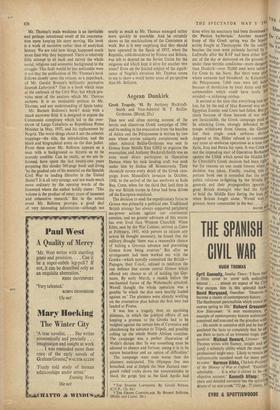Aegean Dunkirk
Greek Tragedy, '41. By Anthony Heckstall- Smith and Vice-Admiral H. T. Baillie- Grohman. (Blond, 25s.)
THIS new and often moving account of the heroic and disastrous Greek campaign of 1941 and its ending in the evacuation from the beaches of Attica and the Peloponnese is written by two men whose stories uniquely complement each other. Admiral Baillie-Grohman was sent to Greece from Middle East GHQ to organise the evacuation, and Anthony Heckstall-Smith was an even more direct participant in Operation Demon when his tank landing craft was sunk under him by Stukas off Monemvasia. Their chronicle covers every detail of the Greek cam- paign from Mussolini's invasion in October, 1940, to the arrival of the last survivors at Suda Bay, Crete, when for the third (but last) time in the war British troops in force had been driven off the European mainland.
The decision to send the expeditionary force to Greece was primarily a political one. Traditional British strategy has always supported peripheral sea-power actions against our continental enemies, and no greater advocate of this course has ever lived than Winston Churchill. When Eden, sent by the War Cabinet, arrived in Cairo in February, 1941, with powers to initiate any action he thought necessary, he found that the military thought 'there was a reasonable chance of halting a German advance and preventing Greece from being overrun.' But after an arrangement had been worked out with the Greeks—which morally committed the British- Papagos, their C-in-C, refused to reinforce the one defence line across central Greece which offered any chance at all of holding the Ger- mans. By early March, a month before the mechanised forces of the Wehrmacht attacked, Wavell thought the whole operation was a gamble 'in which the dice were heavily loaded against us.' The planners were already working on the evacuation plan before the first men had landed at Pirzeus.
It was less a tragedy than an agonising dilemma, in which the political effects of not keeping a promise to the Greeks had to be weighed against the certain loss of Cyrenaica and abandoning the advance to Tripoli, and possibly rolling up the whole North African coastline. The campaign was a perfect illustration of Wolfe's dictum that 'in war something must be allowed to chance and fortune, seeing it is in its nature hazardous and an option of difficulties.'
The campaign went even worse than the planners anticipated. The Olympus line was breached, and at Delphi the New Zealand rear- guard rolled rocks down the mountainsides to block the gorge `just as the God Apollo had
* THE SPANISH LABYRINTH. By Gerald Brenan. (C.U.P., 13s. 6d.) t THE GRAND CAMOUFLAGE. By Burnett Bolloten. (Hollis and Carter, 30s.) done when his sanctuary had been threatened Uhl the Persian barbarians.' Another monstr0 Tllr cr irony of this Greek spring was the hopel° action fought at Thermopylm. On the southeEl The `11 beaches the men were pitilessly harried by 0: \R° Luftwaffe after the RAF had been either bloat b .11 out of the sky or destroyed on the ground. '1,11., juhl:,°11-13- under these terrible conditions—more danger07, than Dunkirk—over 50,000 men were taken s thetin' for Crete by the Navy. But there were pl3c! r where someone had blundered. At Kalamata -"nal s the Peloponnese, 7,000 men were left be111a, s fl fact because of dereliction by local Army and Nast' sin,surne commanders which could have easily be' 'NY avoided—a sickening mishap. the. It seemed at the time that everything had be e al lost, for by the end of May Rommel was on ti.4 h'ets• or Egyptian frontier and Crete had fallen. But Pre,, isalVen cisely because of those hazards of war coralhel are incalculable, the Greek campaign paid 06 gill? an In attacking Crete, strongly defended by tbe, sov,,111.g troops withdrawn from Greece, the Geralv "el a lost their single crack airborne divisioll ane sele, Angered at this, Hitler refused to contemPO (4°1 in any more air-seaborne operations at a time whi mate Syria, Iraq and Persia lay open. It was Crete a° jia'unrit not the impending start of Operation Barbards° f 0 04 against the USSR which saved the Middle East re alw So Churchill's Greek decision had been right,.,"' kir. E but for reasons no one could foresee when I'''°eking, decision was taken. Finally, reading this int' and fat. portant book one is reminded that the savO with public relations in-fighting by the Middle EAR , the generals and their propagandists ignores ,w;IIIParis great British strategist who had the fore and the to hold the Middle East during the lean Yel, blau, when Britain fought alone. Wavell was ,.0" grounds greatest Army commander in the war iiiust be






































 Previous page
Previous page